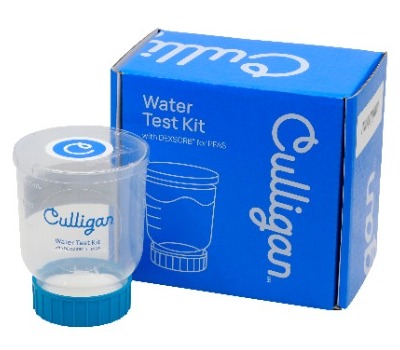What Are PFAS and Why Should You Be Concerned?
Per- and polyfluoroalkyl substances (PFAS) are a group of man-made chemicals that have been used in a wide range of industries since the 1940s. These environmental toxins, known for their resistance to heat, water, and oil, have been utilized in everything from firefighting foams to non-stick cookware. Unfortunately, these substances do not break down easily in the environment or in the human body, leading to their nickname, "forever chemicals."
The persistence of PFAS in the environment and their potential to accumulate in the human body pose significant health risks. Studies have linked PFAS exposure to various health issues, including:
- Higher risk or certain types of cancer (prostate, testicular, kidney)
- Liver damage
- Decreased fertility
- Increased risk of asthma and thyroid disease
- Ulcerative colitis
- Low birth weight
Given these risks, it's crucial to test your water for PFAS contamination, especially if you rely on private well water or live in an urban area near industrial sites known for PFAS use.
How to Test for PFAS at Home
Testing your water for PFAS can seem daunting, but with the right tools and information, it can be straightforward and effective. Home PFAS test kits offer a convenient way to check for the presence of these contaminants. Here's how you can do it:
- Choose a Reliable Test Kit: When selecting a PFAS test kit, it's essential to choose one from a reputable brand, such as the new PFAS test kit from Culligan. Ensure the kit has been validated to the requirements of EPA 537 and 533. These test methods are designed specifically for the detection of PFAS. Be cautious of faulty or gimmick test kits that may offer inaccurate results. Legitimate test kits will reference EPA test protocols, have clear instructions, and a track record of reliability. Checking for customer reviews and seeking expert recommendations can also help you avoid unreliable products and ensure you are using a trustworthy and effective PFAS test kit.
- Follow Instructions Carefully: Each test kit will come with specific instructions. Make sure to follow them meticulously to ensure accurate results.
- Collect the Sample: Use the provided containers to collect water samples from your tap or well. Be sure to avoid contamination by using clean containers and following any guidelines provided.
- Send for Analysis: Some kits allow you to analyze the sample at home, while others may require you to send the sample to a certified lab. Culligan’s test kits are designed to offer reliable at-home testing, easy shipping and clear results sent to you via email typically within 10 working days of receipt at the lab.
How Accurate Are Home PFAS Test Kits?
The accuracy of home PFAS test kits can vary, but high-quality kits like those offered by Culligan are designed to provide reliable results. It's essential to choose a test kit that adhere to EPA testing protocols and has been reviewed for accuracy.
PFAS Detection Methods
PFAS detection and PFAS testing methods typically involve advanced chemical analysis techniques. These methods can detect even trace amounts of PFAS in water. Common methods include:
- Liquid Chromatography-Tandem Mass Spectrometry (LC-MS/MS): This technique is highly sensitive and capable of identifying multiple types of PFAS simultaneously.
- Ion Chromatography (IC): Used to separate and measure different ions, IC can be effective for certain PFAS compounds.
- Enzyme-Linked Immunosorbent Assay (ELISA): A biochemical technique that can detect PFAS at lower concentrations.
Culligan’s home PFAS test kits utilize advanced technology to ensure the detection of these harmful substances with high accuracy.
Treatment Options: Removing PFAS from Your Water
Once you've identified the presence of PFAS in your water, the next step is to remove them. Several water treatment options are effective against PFAS:
- Activated Carbon Filters: These filters can adsorb PFAS from water, making them a popular choice for home water treatment systems. Look for certifications for the carbon system specifically for PFAS to ensure performance.
- Reverse Osmosis Systems: These systems are effective at removing a wide range of contaminants, including PFAS and are a reliable option for ensuring cleaner, safer drinking water.
- Anion Resin System: Anion resins can reduce PFAS levels in your water. The Resin selected should be resin designed specifically for PFAS reduction. Anion resin can be damaged by chlorine and typically needs pre-treatment.
- Combination Systems: Combining treatment technologies ensures that all variations of PFAS are removed down to levels required by new EPA requirements and NSF certifications for Total PFAS. Culligan offers solutions for both point of use and point of entry.
o Culligan’s Aquasential Whole Home PFAS Filter System combines activated carbon with PFAS selective anion resin to ensure long lasting performance.
o Culligan’s Aquasential RO and Aquasential Smart RO Systems combine reverse osmosis technology with an advanced activated carbon Total Defense Filter to reduce Total PFAS by greater than 99.9%.
What Water Filter Will Remove PFAS?
Culligan offers various water filtration solutions designed to tackle PFAS contamination. Activated carbon filters, PFAS Anion resin systems and reverse osmosis systems from Culligan are particularly effective at reducing PFAS, providing peace of mind that your water is safe to drink.
Can My Pitcher Filter Remove PFAS?
Most pitcher filters, while effective at improving the taste and odor of water by removing chlorine and other impurities, are not specifically designed to remove PFAS. The activated carbon in these filters primarily targets organic compounds and chlorine, but it does not effectively capture PFAS molecules due to their size and chemical properties. For effective PFAS removal, it's recommended to use specialized filtration systems such as Culligan's anions system or reverse osmosis systems, which are designed to handle these persistent contaminants.
How Much Does PFAS Testing Cost?
The cost of PFAS testing can vary depending on the method and provider. Culligan’s PFAS test kits are designed to be affordable while maintaining high accuracy. Compared to lab testing, which can be more expensive and time-consuming, Culligan's home test kits offer a cost-effective solution for regular monitoring of your water quality.
Why Choose Culligan’s PFAS Test Kits?
Culligan's PFAS test kits stand out due to their ease of use, reliability, and affordability. Designed to use EPA recognized methodology, these kits provide accurate results quickly, helping you take the necessary steps to protect your health. Additionally, Culligan's extensive range of water treatment solutions ensures that once you detect PFAS, you have access to effective methods to reduce them from your water supply.
Understanding the risks associated with PFAS and knowing how to test for these contaminants are crucial steps in ensuring safe drinking water. With Culligan's new PFAS test kit, you have a reliable and cost-effective tool to detect these harmful substances at home. Stay informed, stay safe, and trust Culligan to help you achieve better water quality.





